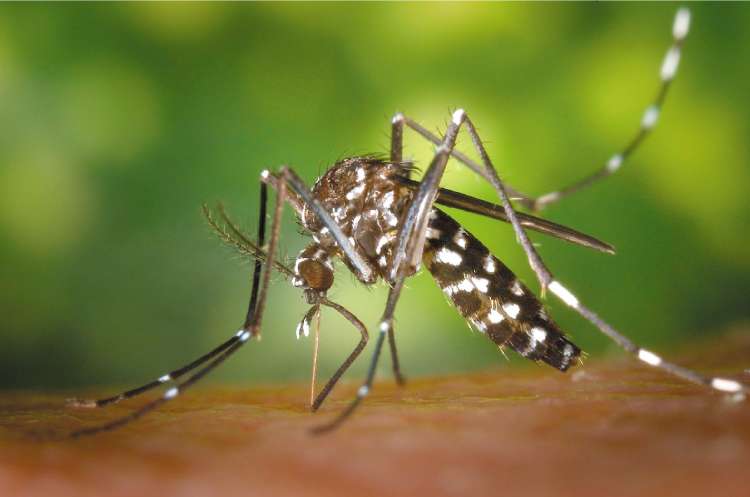Mosquito invasion brings disease risk to UK

Your support helps us to tell the story
From reproductive rights to climate change to Big Tech, The Independent is on the ground when the story is developing. Whether it's investigating the financials of Elon Musk's pro-Trump PAC or producing our latest documentary, 'The A Word', which shines a light on the American women fighting for reproductive rights, we know how important it is to parse out the facts from the messaging.
At such a critical moment in US history, we need reporters on the ground. Your donation allows us to keep sending journalists to speak to both sides of the story.
The Independent is trusted by Americans across the entire political spectrum. And unlike many other quality news outlets, we choose not to lock Americans out of our reporting and analysis with paywalls. We believe quality journalism should be available to everyone, paid for by those who can afford it.
Your support makes all the difference.An Asian mosquito species is poised to arrive in Britain, bringing with it the risk of a potentially lethal disease that the insect can pass from one person to another.
The Asian tiger mosquito has already established itself in northern Italy where it has transmitted chikungunya fever to scores of people. The insect has also been detected in a dozen other European countries, including Germany and the Netherlands.
Health experts are concerned that Britain could be the next country to be invaded after scientists at the Government's Health Protection Agency (HPA) at Porton Down in Wiltshire found that the UK climate is suitable for the mosquito to breed.
The Asian tiger mosquito, Aedes albopictus, has spread rapidly around the world due to the international trade in used car tyres, which carry the mosquito's eggs in trapped water inside the rim of the tyre. However, the popularity of lucky bamboo – a Chinese house plant that is transported in water-filled pots – has also spread the insect through ports such as Rotterdam.
A study by HPA scientists found that "widespread establishment" of the Asian tiger mosquito across England and Wales is possible in the warm, damp conditions of the British summer, which would increase the risk of chikungunya fever spreading among the local population.
"The mosquito has popped up across Europe and although we haven't found it yet in the UK, we have identified the potential for it to come here," said a spokesman of the HPA's Porton Down laboratories.
There has been a dramatic increase in the number of British people returning from South-east Asia with chikungunya virus over recent years – from about six a year in 2004 to more than 130 in 2006 – and if the tiger mosquito becomes established here it could create a locally spread epidemic. "You do need several steps in the chain for it to become an issue, but it's something we've been keeping an eye on. Most people think of malaria, but there are other things you can catch from mosquitoes," the spokesman said.
People with chikungunya develop a fever that lasts a couple of days but they go on to suffer intense headaches, joint pains and insomnia for days or weeks after they are bitten. One woman died during last year's Italian outbreak. The virus was confined to certain parts of south-east Asia but in recent years it has spread across the Indian sub-continent, aided by the tiger mosquito. The start of the Italian epidemic was traced to an Italian tourist who had returned last June from the Indian state of Kerala with a fever.
Between June and September there were 292 suspected cases of chikungunya fever in the north-eastern Italian province of Ravenna, where the tiger mosquito has become well established since its first documented appearance in Italy in 1990.
A report by the European Centre for Disease Prevention and Control (ECDC) in Stockholm found that the invading population of tiger mosquitoes in Ravenna caused the chikungunya virus to spread from the single infected tourist to scores of local residents. "The outbreak of chikungunya fever in north-eastern Italy is the first documented local vector-borne transmission of chikungunya virus within the European mainland," the report said. The report added that the importance of the event "should not be underestimated".
The mosquito managed to transmit the disease to a third of the inhabitants of the French island of La Reunion in the Indian Ocean in the space of a few weeks.
The ECDC has also identified parts of Britain, including southern England, as being suitable for the tiger mosquito.
The female mosquito can feed on human blood and is known for her quick, penetrating bite and the fact that she feeds throughout the day, and not just in the evening like many other mosquitoes. It is also known to transmit dengue fever and can carry about 20 other viral diseases.
The illnesses that could hitch a ride to Britain
The tiger mosquito can carry the following:
* Chikungunya
Begins with a fever that lasts a few days but persistent headaches and pains in the joints and limbs can last for weeks or months.
* Dengue
Caused by another virus but with similar symptoms to chikungunya – fever followed by severe pain in the joints, headaches and vomiting.
* Yellow fever
Sudden fever and headaches but can develop into chills, bleeding, rapid heartbeat, headache, back pains as well as "coffee ground" vomit that contains blood.
Join our commenting forum
Join thought-provoking conversations, follow other Independent readers and see their replies
Comments